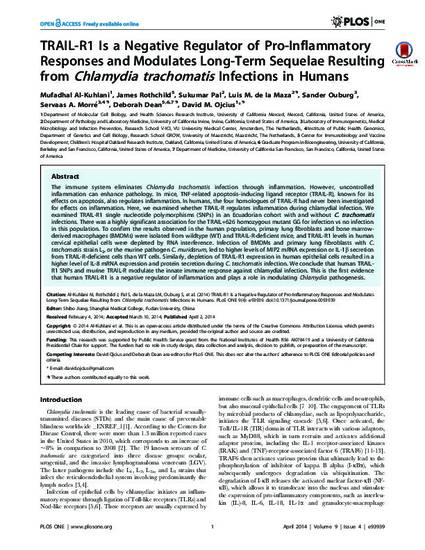
The immune system eliminates Chlamydia trachomatis infection through inflammation. However, uncontrolled inflammation can enhance pathology. In mice, TNF-related apoptosis-inducing ligand receptor (TRAIL-R), known for its effects on apoptosis, also regulates inflammation. In humans, the four homologues of TRAIL-R had never been investigated for effects on inflammation. Here, we examined whether TRAIL-R regulates inflammation during chlamydial infection. We examined TRAIL-R1 single nucleotide polymorphisms (SNPs) in an Ecuadorian cohort with and without C. trachomatis infections. There was a highly significant association for the TRAIL+626 homozygous mutant GG for infection vs no infection in this population. To confirm the results observed in the human population, primary lung fibroblasts and bone marrow-derived macrophages (BMDMs) were isolated from wildtype (WT) and TRAIL-R-deficient mice, and TRAIL-R1 levels in human cervical epithelial cells were depleted by RNA interference. Infection of BMDMs and primary lung fibroblasts with C. trachomatis strain L2, or the murine pathogen C. muridarum, led to higher levels of MIP2 mRNA expression or IL-1β secretion from TRAIL-R-deficient cells than WT cells. Similarly, depletion of TRAIL-R1 expression in human epithelial cells resulted in a higher level of IL-8 mRNA expression and protein secretion during C. trachomatis infection. We conclude that human TRAIL-R1 SNPs and murine TRAIL-R modulate the innate immune response against chlamydial infection. This is the first evidence that human TRAIL-R1 is a negative regulator of inflammation and plays a role in modulating Chlamydia pathogenesis.
Available at: http://works.bepress.com/david-ojcius/218/
